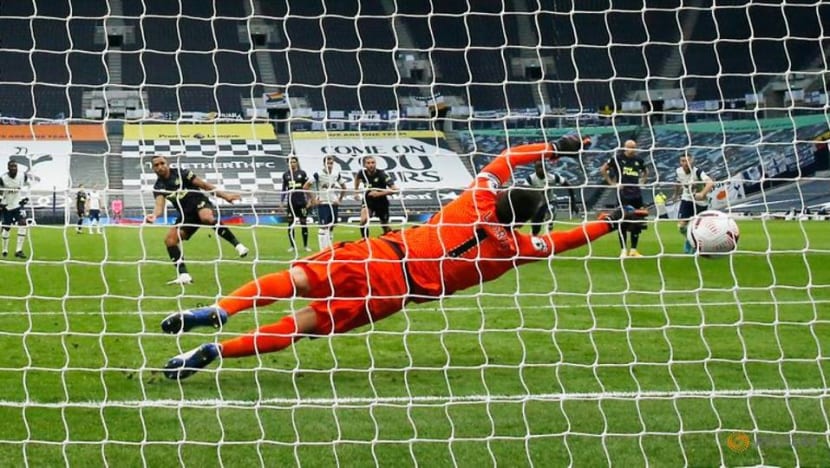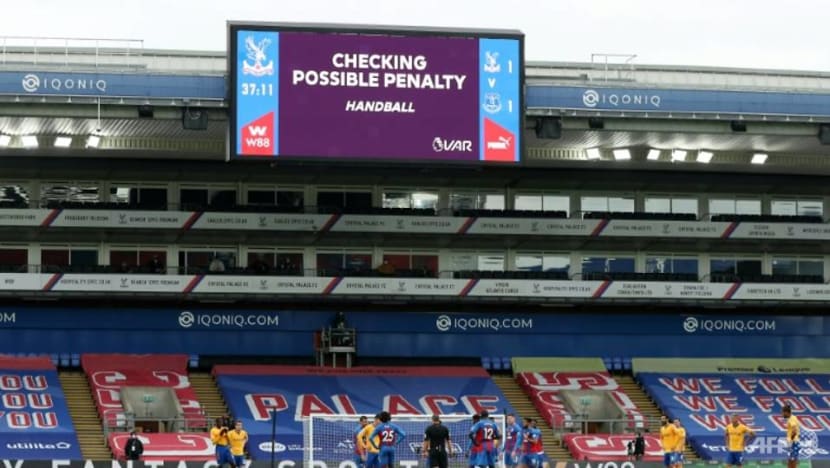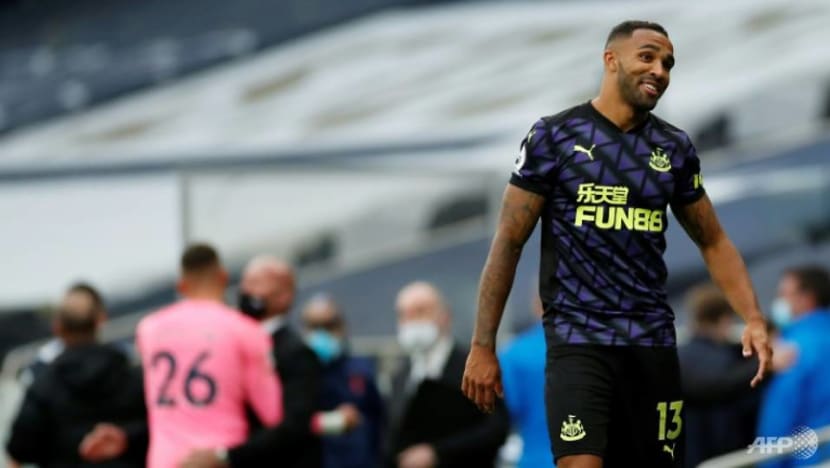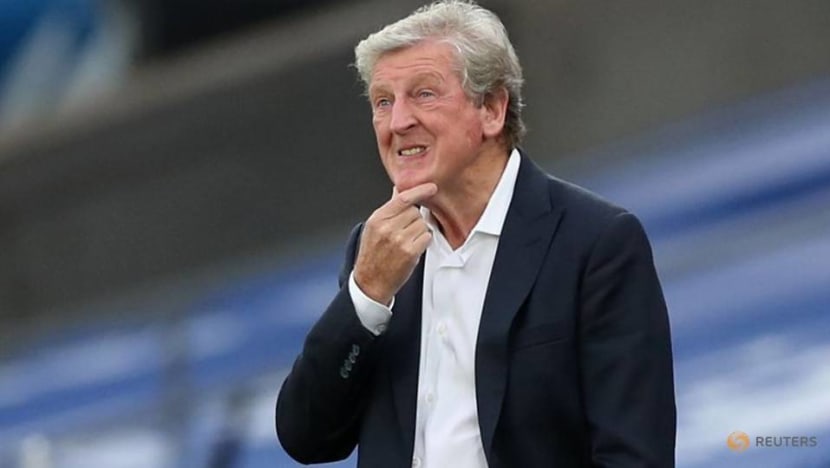commentary Commentary
Commentary: What is behind the EPL’s record goals haul this season?
The average goals per game in the 28 games so far this season is by some distance the highest average in the league’s history, beating the previous record set in the 2018 to 2019 season, says John Duerden.

Newcastle United's Callum Wilson scores their first goal from the penalty spot. (Photo: Pool via REUTERS/Andrew Boyers)
SINGAPORE: On Sep 21, Brazilian forward Gabriel Jesus scored against Wolverhampton Wanderers, a goal that not only gave Manchester City a 3-1 win but also made history in the English Premier League (EPL). It was the 44th goal of the round, the highest number ever scored since the number of teams were reduced from 22 to 20 in 1995.
After three rounds of the 2020 to 2021 season so far, there have been 103 goals scored in 28 games - two did not take place in the opening weekend. If it is sustained, that 3.68 goals a game average would be by some distance the highest average in the league’s history, beating the 2.82 set over the 2018 to 2019 season.
One may think the higher number of goals is the result of the EPL now having more talented attacking players than before.
READ: Commentary: Klopp will lead Liverpool to EPL glory again
It has become common place since the beginning of the EPL for the top teams such as Liverpool, Manchester City, Manchester United, Arsenal, Chelsea and Tottenham Hotspurs to boast of world-class attackers.
But now, most of the other 20 teams have also over the years added to their attacking prowess – like Jamie Vardy at Leicester, Danny Ings at Southampton, Jack Grealish at Aston Villa, Crystal Palace have Wilfred Zaha, Raul Jimenez at Wolverhampton Wanderers as well as Dominic Calvert-Lewin and Richarlison at Everton.

The list goes on and probably explains why the smaller clubs in the league have also become more difficult to beat than before.
However, this trend has been observed for a few seasons now already - the players mentioned above have been firing goals for their clubs for a while and are not new additions.
With the COVID-19 pandemic depleting clubs’ financial reserves, only a handful of teams outside the “favourites” group have added new attacking talent - Colombian playmaker James Rodriguez joining Everton the most notable. So doubtfully the presence of more attacking players could have made the difference in this season being more prolific than previous ones.
READ: Commentary: EPL clubs can't always count on expensive foreign players for success
There is more to it. In a traditionally low-scoring sport such as football, more goals usually means more entertainment, more action and more drama. Despite that, there are a number of concerns being expressed by some prominent voices in England, paradoxically, in terms of “football being ruined”.
The current debate is focused on the number of penalties being given so far. Last season, there were an average of 0.24 spot-kicks per game. So far this time, it is 0.71, a ratio almost three times higher. In the first 30 games of last season, eight penalties were awarded. In the first 28 games played this time around, 20 were given by referees.

Six of those have been given for handball. So far this season, there has been a penalty for handball given every 0.21 games. Last season, it was 0.05. Many people in the game are angry about this trend.
HANDBALL
Why is this happening? Starting June, there was a change in how the handball rule would be interpreted this season with any handball that takes place above shoulder height regarded as a penalty, irrespective of intent, position or distance from the ball when it was struck.
Under this interpretation, a player will be always penalised if the arm or hand is away from the body or in the air, or if the player is leaning into the ball’s path even if he does so unintentionally.
READ: Commentary: Spanish domination of European football is nearing its end
Previously, referees had to use their judgement to determine if a handball foul was intentional or not, and if happened in the penalty box then it if it was a penalty.
The EPL referees have been following the new interpretation strictly. The justification for the change was to bring in more consistency, to make decisions more objective and reduce the pressure on officials who had been trying to understand the intent of players who committed handball and whether they had done so on purpose or accident.
The efforts have not been received well, especially in last weekend’s matches. Three games were decided by controversial penalties that were given because of handball. The decisions caused Brighton and Hove Albion and Crystal Palace to lose and cost Tottenham Hotspur two points.

The handball by Tottenham defender Eric Dier against Newcastle United on Sunday was especially interesting as he could not see the ball when it hit his hand. He did however have his hands above his shoulder and wide in the air.
CRITICISM
Leading pundit and former England and Liverpool star Jamie Carragher was scathing about the Dier decision.
“Eric Dier jumps for the ball, has no control of where his arms are going to be, it was a header half a yard away from him, hits him on the back of his arm, he has no idea what’s going on. This is a joke.”
Tottenham coach Jose Mourinho was understandably unhappy about his team conceding a goal and losing two points in the last minute of an important game but even opposite number Steve Bruce, whose Newcastle team benefitted from the decision, was critical.
READ: Commentary: Messi and Ronaldo are the best ever. We will not see any more like them
“The handball (rule) has been around for a hundred years,” said Bruce. “If it is deliberate, no problem, but it has to be clear and obvious. We have lost the plot with it and it loses the spectacle of it.”
And then there was former England coach Roy Hodgson, now in charge of Crystal Palace, saying that the handball rule had become unfit for purpose.

Hodgson said that penalties should be given for deliberate handballs and not for accidental infractions. It sounds reasonable but does, however, take referees back to the situation of trying to decide if players intentionally handled the ball.
“I just don't understand how we've allowed it [the handball] to happen,” Hodgson said. “I think the rule is a nonsense. I think it's a nonsense when we get one, I think it's a nonsense when we get one against us and I think it's only serving the purpose… for polemics, discussions and dramatic moments.”
More dramatic moments may not be a bad thing for this season at least. Amid all the criticism and the talk of football being ruined, there is an acknowledgement that with games played in empty stadiums, the viewing experience of watching the EPL is less exciting than before.
In the absence of fans and the atmosphere that have done so much to make the league the most popular in the world, more goals and controversy do, at least, add more drama and excitement to the viewing experience even if it comes at the expense of justice and fairness to some teams.
When there is no colour and little atmosphere, the extra goals can play a part.
READ: Commentary: Don't expect football clubs to splash big bucks this transfer window
Bowing to pressure and criticism, however, the EPL announced on Wednesday (Sep 30) that referees can apply more leniency in making decisions for the next round of games.
They “can now assess a player's expected body position and his proximity to the opponent, which means that a player is only likely to be penalised for handball if the arm is out from the body or if the ball has travelled a distance,” media reported.
As long as they apply the rules consistently then it is the same for everyone.

With these revised rules, last week’s games would have turned out differently – while the penalties awarded against Tottenham and Brighton would still stand, the one against Crystal Palace would likely have not, meaning that the London-based club could have avoided defeat against Everton.
Introducing more subjectivity may not necessarily guarantee fairness in awarding such decisions but relaxing the rules may impact the number of goals and entertainment each match brings.
And that, whichever way you look at it, is a net loss to fans around the world. The high-scoring games had become a welcome addition to an otherwise sterile year for sports fans deprived of watching games in person or, in some cases, playing them.
READ: Commentary: Liverpool's victory in time of pandemic is both agony and ecstasy
At the moment at least, anything that makes games more exciting to watch should be celebrated, or at least tolerated.
John Duerden has lived in Asia for 20 years and covers the region’s sporting scene. He is the author of three books including Lions & Tigers - The History of Football in Singapore and Malaysia (2017).















